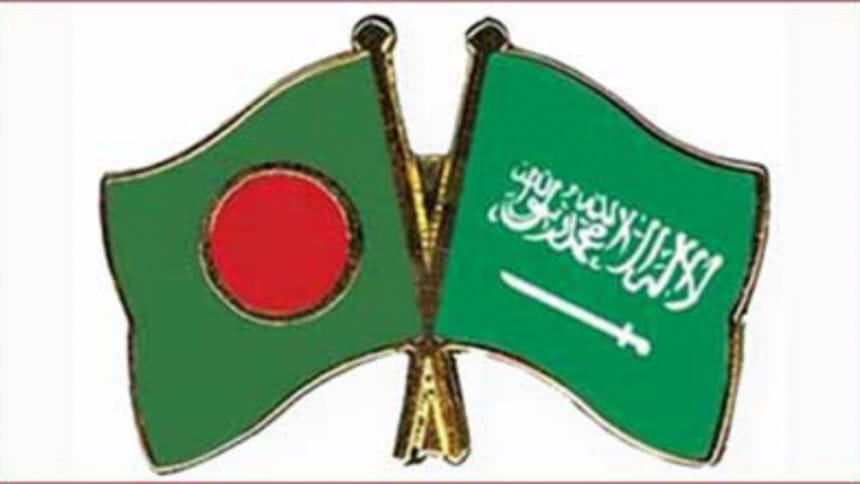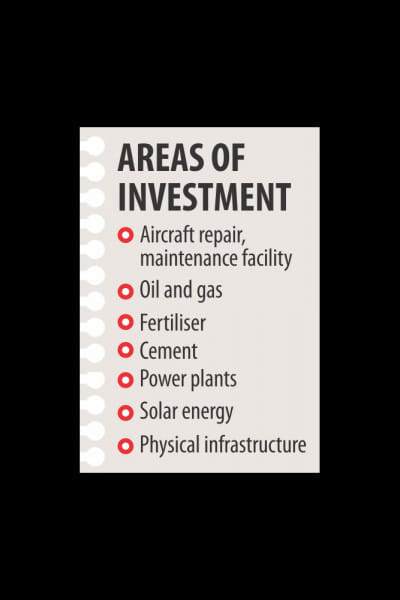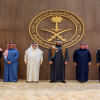Saudi to invest in 30 big projects

Saudi Arabia plans to invest several billion dollars in more than 30 projects in Bangladesh, including setting up an aircraft repair and maintenance facility in Lalmonirhat.
The plan is part of Saudi efforts to boost bilateral and economic ties between the countries, said government officials in Dhaka.
A large Saudi delegation, including two senior ministers, is expected to arrive here next month. The team will discuss the multi-billon dollar investment with officials of the Prime Minister's Office and ministries concerned, they said.
The development comes after Prime Minister Sheikh Hasina's visit to the Kingdom in October last year.

While in Riyadh, she had called upon the Saudi business community to utilise the trade opportunities in Bangladesh.
Hasina also met Saudi Crown Prince Mohammed bin Salman bin Abdulaziz Al Saud, who expressed his keen interest in becoming Bangladesh's development partner.
Talking to The Daily Star, Bangladesh Investment Development Authority (Bida) officials said the oil-rich kingdom wanted to invest in commercially viable projects in Bangladesh, targeting oil and gas, fertiliser, cement, power plants, solar energy, and physical infrastructures.
Last month, Golam Moshi, Bangladesh Ambassador to Saudi Arabia, sent the Bangladesh foreign ministry a list of projects in which Saudi entrepreneurs have shown interest.
"Around 30 to 35 projects are expected to come up for discussion when the Saudi delegation comes to Bangladesh," Bida Executive Chairman Kazi M Aminul Islam told this paper.
Asked, he said it was difficult to estimate the amount of the investment right now.
Details of the projects and their finances will be finalised following the visit, he said.
Apart from the projects, Bangladesh will also seek around $1 billion as investment fund for its stock market and industrial finance.
Bangladesh would propose half the money for stock market and the other half to be disbursed to private sector entrepreneurs through financial institutions. The amount may come either as equity finance or loan, Aminul said.
If the Saudi delegation's visit turns out to be successful, the crown prince may also visit Bangladesh, he said.
According to the project proposals sent by the Bangladesh embassy in Riyadh, the Gulf country is eager to set up an aircraft repair and maintenance facility.
Saudi's lone aircraft repair and maintenance company, Al Salam Aerospace -- jointly owned by its government and Boeing -- has already expressed its interest to develop the facility in Lalmonirhat, documents show.
A delegation from the company has recently visited Bangladesh and explored the potentials and skills of Bangladeshi workers in the sector.
On the other hand, another team, led by Chief of Bangladesh Air Force (BAF) Air Marshal Masihuzzaman Serniabat, also visited Al Salam's facilities in KSA.
The facility in Lalmonirhat will be developed by the air forces of the two countries, sources said.
The BIDA executive chairman said, "After Singapore and Dubai, Bangladesh has a huge potential to become an aviation hub. Apart from the infrastructural facility, skilled manpower is a must for that."
Once built, repair and maintenance of both military and commercial passenger aircraft could be done there, he said.
A unique proposal to set up a Di-ammonium Phosphate (DAP) and urea fertiliser plant may also come up for discussion during the upcoming Saudi team's visit.
The speciality of the project is that the plant would be built outside the country -- either in Saudi Arabia or Morocco -- as the raw materials would easily be found there, according to the proposal.
State-run Bangladesh Chemical Industries Corporation (BCIC) and Saudi-Korean company Hanwah, will form a joint venture company for setting up the plant, it said.
Fertiliser to be produced at the factory will be imported to Bangladesh and the companies have already signed a memorandum of understanding to this end, the documents show.
The Bangladesh embassy in Riyadh said it was waiting for confirmation from the Saudi side about guaranteed supply of the raw materials, mainly phosphate.
The Kingdom of Morocco welcomed Bangladesh investment for the DAP plant, including the supply of raw materials, says the proposal.
Talking about it, the Bida executive chairman said other countries were running similar projects and claimed that it would be viable for Bangladesh.
Contacted, Zahid Hussain, lead economist at the World Bank's Dhaka office, said the proposed joint venture appears to be still at an “exploratory stage”.
"Economic viability from Bangladesh's national point of view will depend not just on the guaranteed supply of raw materials but also on the terms of the joint venture contract between Hanwah and BCIC," he said.
“The devil is always in the detail,” he said, adding that BCIC may not only be a joint owner but also the buyer of DAP and urea to be produced either in Morocco or Saudi Arabia.
The terms of three contracts will therefore be the most important: the phosphate supply contract, the urea/DAP purchase contract and the profit and risk sharing arrangements, Zahid said.
"We hope BCIC will negotiate these deals smartly guarding against the 'moral hazard' associated with public-private partnerships that risk degenerating into private profit and public loss," he added.


 For all latest news, follow The Daily Star's Google News channel.
For all latest news, follow The Daily Star's Google News channel. 




Comments